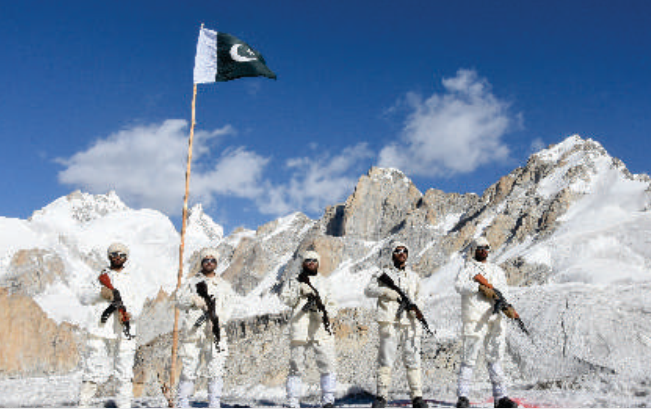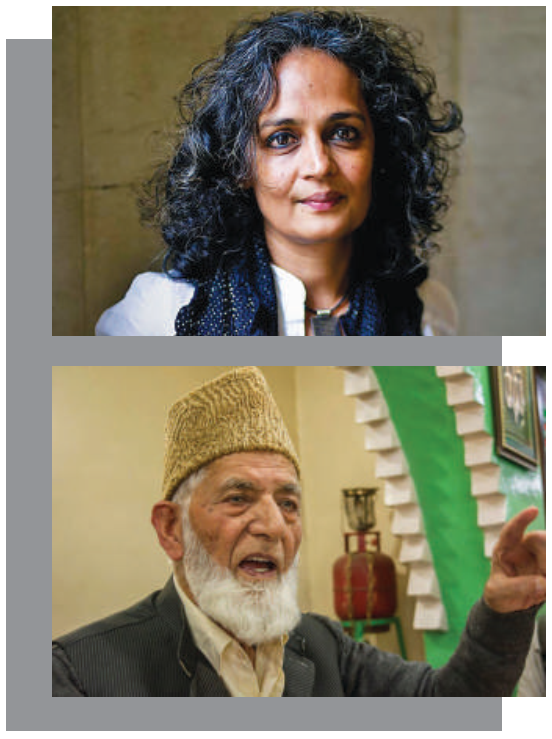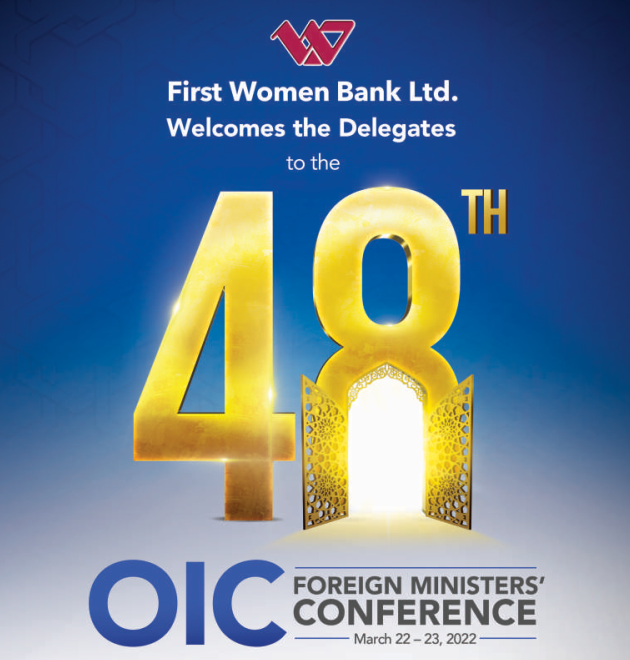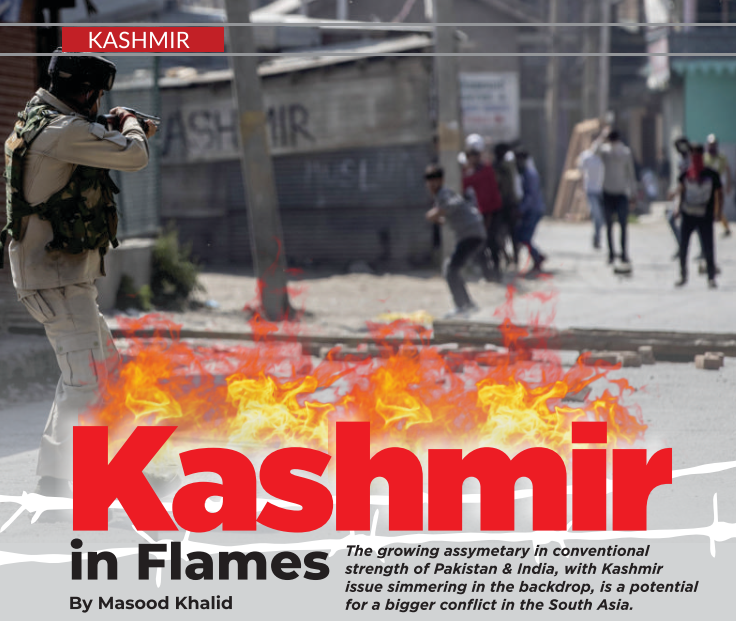
By Masood Khalid
The growing assymetary in conventional strength of Pakistan & India, with Kashmir issue simmering in the backdrop, is a potential for a bigger conflict in the South Asia.
Kashmir has been a source of at least three full-fledged wars between India and Pakistan and today it is a ticking bomb in nuclearized South Asia. When India and Pakistan became independent countries in 1947, there were over 500 princely states constituting the British Empire. The partition plan envisaged that the princely states will either join India or Pakistan, taking geographical, religious, cultural factors into account.
By that token, Muslim majority Kashmir should have joined Pakistan. History, however, bears witness to the fact that India manipulated the accession of not only the Muslim majority state of Jammu & Kashmir but also coerced accession of the states of Junagadh and Hyderabad. While it succeeded in taking control of Hyderabad and Junagadh, being Hindu majority states, it failed to subjugate the people of Kashmir. Their seven decade long epic struggle for freedom amply manifests their resolve not to accept the Indian rule.
It is ironic that India, which had itself referred the Kashmir case to the UN Security Council and whose first Prime Minister had pledged to hold a “plebiscite” to let the Kashmiris decide their own future, subsequently reneged on its commitment and instead mounted a reign of terror to suppress them in clear violation of the UN Security Council resolutions and international law. One needs to ask, how and why India which claims to be the largest democracy, boasts of inclusivity and secularism, aspires permanent membership of the UN Security Council and is the favourite of major democracies, is allowed to disregard international law and UN Charter with such impunity.
Today, the valley of Kashmir is practically under a siege, with over half a million Indian troops protected by draconian laws, indulging in acts of state terror with no questions asked.
Today, the valley of Kashmir is practically under a siege, with over half a million Indian troops protected by draconian laws, indulging in acts of state terror with no questions asked. Prominent Kashmiri leaders are in jail without trials. Even the pro-Indian Kashmiri leaders are alienated and have raised their voice against the excesses of BJP government.
After winning his second term in office in 2019, Prime Minister Modi revoked the Articles 370 and 35-A of the Indian constitution, which recognised the special status of Jammu & Kashmir. Pakistan rejected this unilateral act of India. China also refused to accept this decision. This Indian act was so grave that the UN Security Council met three times in four decades to discuss the development.
Pakistan argued that India cannot alter the status of a territory which is recognised as “disputed” by the UN as well as by major powers. Stoking ultra right extreme nationalist sentiments, Modi regime did not stop there and started changing the demographic character of the Kashmir valley by administrative measures, aimed at reducing Muslim majority into a minority. The objective is clear. Once India secures a Hindu majority in Kashmir, it may even agree to a plebiscite, which will have no legitimacy or legality without UN’s involvement.
UN is a party to the dispute but India does not allow access to the UN Observer Group in the occupied territory. In fact, it has tried to abolish their presence. It has also attempted deletion of the Kashmir issue from the UN agenda, but Pakistan has foiled these attempts. India also does not allow free access to international media and humanitarian organisations like the Amnesty International and Human Rights Watch. It contemptuously rejects international mediation or good offices of the UN. It does not allow OIC Missions to Kashmir which has always supported the just cause of the Kashmiri people, widely appreciated by the people of Pakistan. Other bilateral issues between India and Pakistan like the Siachin, Sir Creek, facilitation of religious pilgrims etc have also faced lack of progress.
India has refused any positive consideration of Pakistan’s proposal of a Strategic Restraint Regime for conventional and strategic stability in South Asia. On all these and other issues, India is found dragging its feet. Bilaterally or multilaterally, India is not prepared to resolve its issues with Pakistan. On the other hand, Pakistan has consistently called for dialogue to settle its disputes with India. Recently, it allowed overland transportation of wheat from India to Afghanistan.
Many notable Indian intellectuals and human rights activists have protested against the harsh and discriminatory policies of BJP government, threatening the lives of not only Muslims but other minorities in India and in the Indian illegally occupied Jammu & Kashmir. Famous writer Arundathi Roy wrote in August 2019 that the Indian action of 5 August 2019 has turned Kashmir “into a giant prison camp”. She added that since 1947, there is not a single year, when the Indian Army has not been deployed against its “own people” in Kashmir, Mizoram, Nagaland, Manipur, Hyderabad and Assam. Roy said that “today Kashmir is one of the most or perhaps the most densely militarised zones in the world. More than half a million soldiers have been deployed to counter what the Army itself says is now just a handful of terrorists.”
Former Chief Minister of Kashmir Farooq Abdullah, in an interview with Karan Thapar last year, criticised Indian illegal annexation of Kashmir and policy of Hindutva and raised serious questions on the future of India, if current policies continue. This commentary by eminent Indians belie the allegations that the freedom struggle in Kashmir is Pakistan inspired. Growing intolerance, discrimination and violence by BJP extremists against minorities, vividly captured by cameras, and its condoning by the Indian leadership, has aroused grave concern amongst the rational elements in India. They are cautioning against waves of frenzy which may slide India into a deeper abyss of sectarian and religious divide.
The UN Human Rights Commission in its reports of 2018 and 2019 has recommended investigation of Indian policies in Kashmir. The Genocide Watch has issued successive alerts of a genocide in Kashmir; widespread violations of human rights; dehumanising Muslims as “terrorists” and cutting off means of communication. These are vivid examples of an exclusionary “Hindutva” driven ideology being followed by Modi government and sufficiently documented by neutral observers.
Global media and world parliaments have also expressed serious concern over Indian policies. The UN Secretary General has urged India to end the use of pellet guns and endorsed Pakistan’s stance that the Security Council resolutions on Kashmir are still valid. So the Indian position that Kashmir is an integral part of India holds no legal ground and is totally fallacious.
Pakistan believes that the current situation in occupied Kashmir is untenable due to its implications for peace and security of South Asia. Two nuclearized neighbours cannot live on a knife edge. India’s acquisition of sophisticated weaponry, weaponisation of its nuclear programme, nuclearization of the Indian Ocean, deployment of bulk of Indian Army on Pakistan’s border, its threat to militarily occupy Azad Kashmir, its claim on Pakistan’s Gilgit-Baltistan region, its opposition of CPEC, is raising tensions in the region.
The growing assymetary in conventional strength of the two countries, with Kashmir issue simmering in the backdrop, is a potential for a bigger conflict in South Asia. Pakistan has been drawing the attention of the international community towards the perils of this competition and the vicious circle in which South Asia finds itself due to India’s revisionist approach.
Pakistan has called for confidence building and deescalation through a sustained dialogue between India and Pakistan to resolve their issues, particularly the Kashmir dispute.
Pakistan is prepared to implement the UN Security Council resolutions to mitigate the sufferings of the Kashmiri people. Pakistan has an abiding interest in maintaining peace and stability in South Asia on the basis of mutual respect and sovereign equality.
A long term solution of the Kashmir dispute is in the interest of both India and Pakistan. Formidable challenges of poverty, climate change, food security, water security and translational terrorism, warrant a common agreed strategy amongst the regional neighbours.
India’s action of August 2019 in Kashmir has been a great setback for efforts to build trust and regional peace. The onus now lies on India to take the initiative for creating an enabling environment to reduce tensions and embark on a path of peace and amity with its neighbours.
It is equally incumbent on the international community to lend its forceful voice in favour of peace in South Asia and an amicable settlement of the Kashmir dispute in accordance with the aspirations of the Kashmiri people.
International community has a moral responsibility to ask India to stop its repression in occupied Kashmir and to desist from raising the temperature. India can no longer hide behind the ruse of Pakistan bogey to negatively depict the just struggle of the Kashmiri people. The world needs to ask India as to why she has not been able to extinguish the flame of freedom lit by the Kashmiri people for past seven decades, despite all its antics.
It would simply be naïve to assume that the issue will vanish with the passage of time and Kashmiris will accept the ‘status quo’. This miscalculation could have an unbearable cost for India. The region wishes to move on to the path of common development through greater integration and connectivity.
It cannot remain mired in internecine conflicts and senseless strife. Pakistan wishes to be a partner with others in peace and development of the region.
As the largest country of South Asia, India is expected to play a responsible role for peace and security of the region and contribute to its prosperity. On its part, Pakistan will use all means available to promote peace in South Asia, while firmly standing on the side of the Kashmiri people till they achieve the right of self-determination as guaranteed to them by the international community.
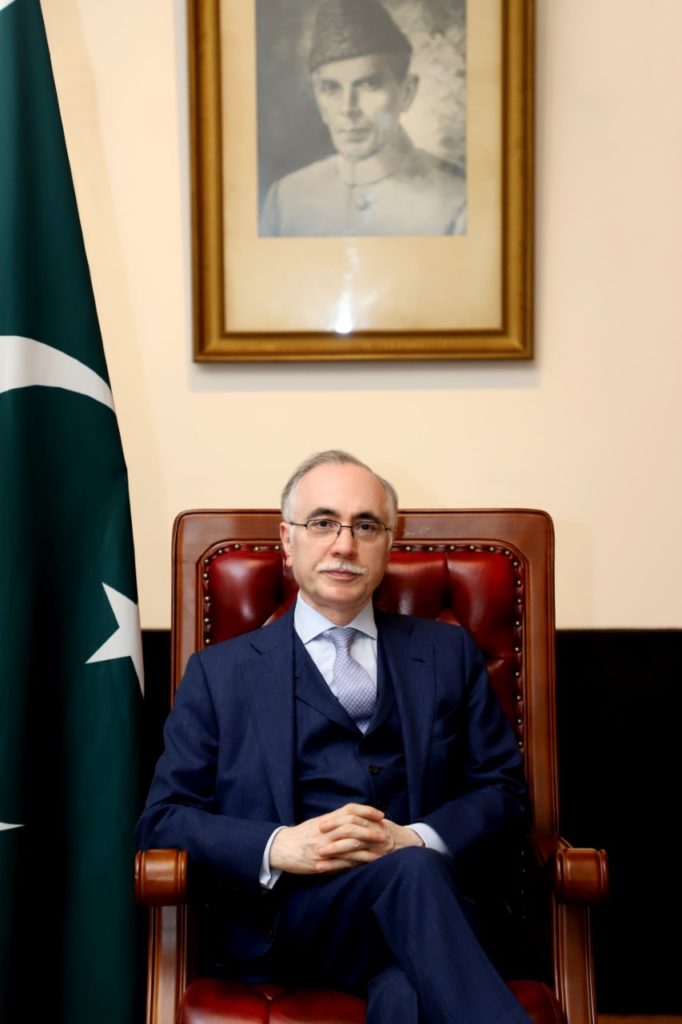
The writer is the former ambassador.

